Coolant has a sweet smell that you'll likely recognize! It's often compared to maple syrup or burnt sugar, which makes it a bit inviting, doesn't it? You might notice this scent more when the engine's hot or if there's a leak. That sweet aroma can mean something's not right, so keep an eye out! If you catch that smell near your car's hood or wheel well, it could be a sign that you need to check the coolant. Staying alert to these odors can help your vehicle run smoothly. There's a lot more to discover about keeping your car healthy!
Key Takeaways
- Coolant has a sweet smell reminiscent of maple syrup or burnt sugar, primarily due to ethylene glycol.
- The odor becomes stronger when the engine is hot or during a coolant leak.
- A light white smoke from the exhaust may indicate coolant entering the combustion chamber.
- The sweet smell is often detected around the wheel well or hood edge, signaling potential leaks.
- Ignoring the coolant smell can lead to serious engine problems, so prompt attention is essential.
Introduction
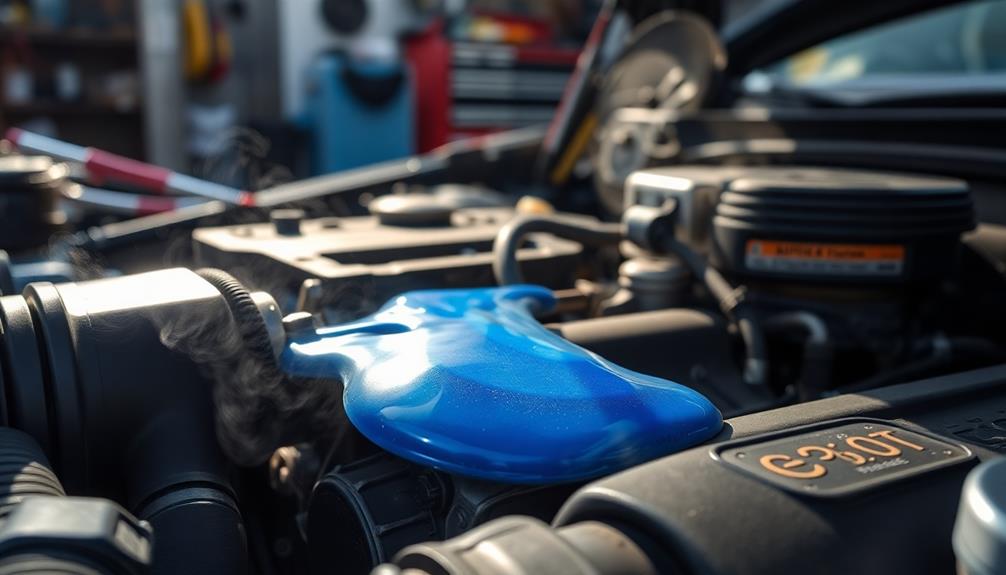
Noticing a coolant smell can be unsettling, especially when you're behind the wheel.
You might smell something sweet, kind of like candy or maple syrup. This sweet smell often means there's a problem in your car's cooling systems. It could be that the coolant is leaking somewhere, and that's not good news!
You should pay attention if you see light white smoke coming from the exhaust. That can happen when coolant is overheating or leaking.
When you catch a whiff of that sweet smell, it could mean your car has coolant leaks or a problem with the heater core. Sometimes, it can even be a sign of a head gasket failure!
Description of the Smell
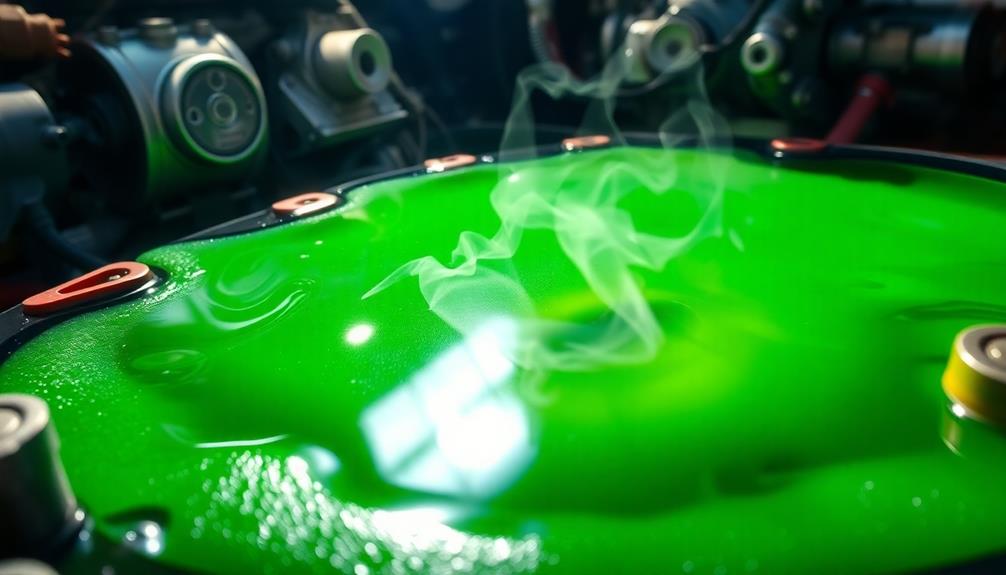
When you catch a whiff of coolant, you're likely to notice its sweet scent, reminiscent of maple syrup or burnt sugar. This smell usually becomes stronger when the engine is hot or if there's a leak. If you ever smell antifreeze, it's important to pay attention! The scent can change based on its ingredients, especially if it's made with ethylene glycol. This particular chemical has a unique odor that can hint at problems in your vehicle.
Sometimes, when coolant is burning, you might even spot light white smoke coming from the exhaust. This can be a sign that the coolant is sneaking into the combustion chamber, which isn't a good thing. You can often detect a strong coolant smell around the wheel well, hood edge, or after parking in tight spaces. These odors suggest that there could be a leak in your cooling system.
While it might smell sweet, don't forget that prolonged exposure to coolant fumes, especially ethylene glycol, can be harmful.
Source and Composition
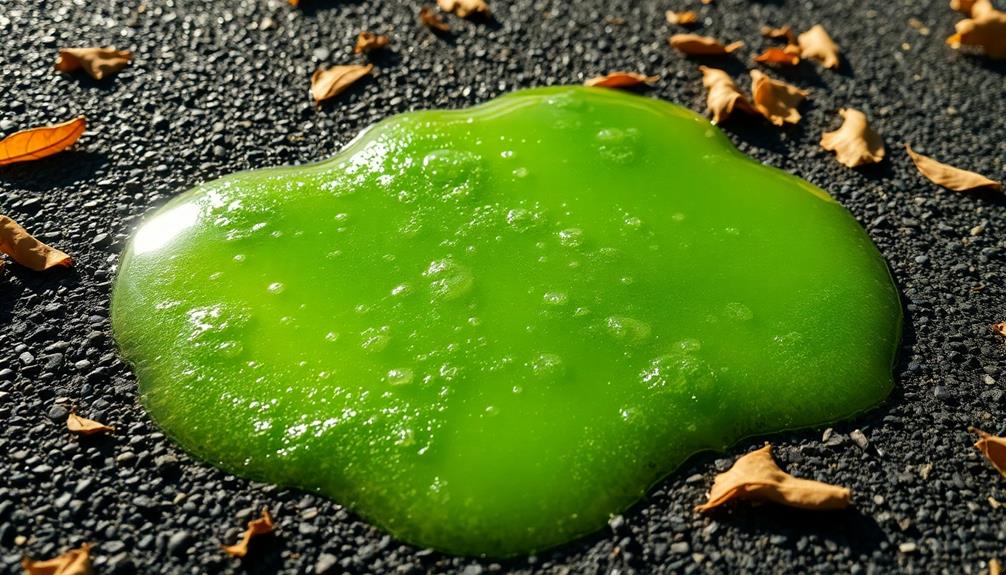
Coolant's distinct sweet smell comes primarily from its main components: water and either ethylene glycol or propylene glycol.
When you smell coolant, it's often because there's a small leak somewhere in your car. Ethylene glycol gives off a stronger scent, similar to candy or maple syrup, while propylene glycol's smell is milder.
If your coolant levels are low, it's essential to check for leaks. A sweet smell can mean trouble, especially if it's coming from the heater core or radiator.
If you ignore it, you might face engine failure down the road! When the engine gets hot, the smell becomes even stronger, as the coolant evaporates and escapes through tiny openings.
Typical Scenarios or Environments
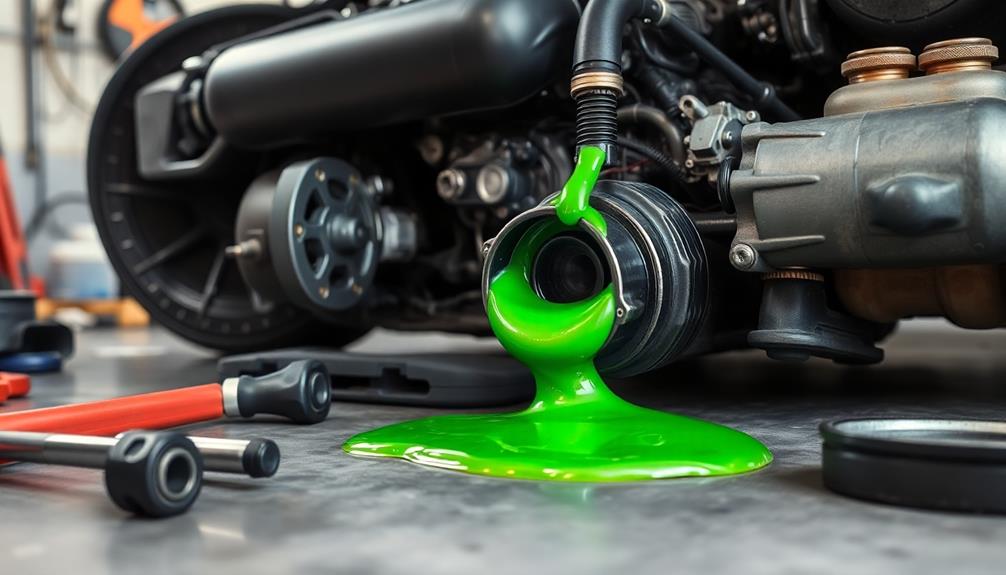
Many drivers encounter the sweet smell of coolant in typical scenarios, especially after a drive. This smell, often compared to maple syrup or burnt sugar, is most noticeable when you park your car in an enclosed space like a garage.
If you've just been driving and notice the scent near the wheel well or hood edge, it could mean something's up. A strong smell of antifreeze can often be traced back to a coolant leak. If you see wet spots under your vehicle, that's a sure sign you might've a problem.
Sometimes, the smell gets even stronger in places like drive-thrus, where the engine gets hot and makes the sweet smell more noticeable. In these confined spaces, the odor tends to linger due to the lack of ventilation, amplifying the intensity of the scent. Some describe it as having sourdough starter smell characteristics, a yeasty, slightly tangy aroma that can be both pleasant and odd. Over time, the scent may blend with other environmental factors, making it even harder to ignore. This combination of scents can sometimes create confusion, as it may remind people of other familiar smells, making it challenging to pinpoint the exact cause. In some cases, people notice undertones similar to **benzene’s characteristic smell**, a sweet and slightly gasoline-like odor that can contribute to the overall peculiar sensory experience. As the scent persists, many find themselves growing more sensitive to its presence, sometimes even associating it with other areas where the same conditions arise.
Don't forget to check your radiator cap, too! If it's loose, coolant might escape, causing that familiar odor. You should also keep an eye out for heater core problems, as they can lead to that same sweet smell.
Emotional or Cultural Associations

The sweet smell of coolant often stirs up a mix of emotions and cultural connections for those who encounter it. For many, this pleasant aroma brings a wave of nostalgia, reminding you of childhood road trips with family or fun times spent around vehicles. It's like the scent of maple syrup, a reminder of those special moments.
In some cultures, the smell of coolant symbolizes the importance of vehicle maintenance. It reflects a greater appreciation for machines and how they work. However, when you catch that distinct scent, it might also make your heart race. You could worry about potential vehicle failures and the financial burdens of repairs that might follow.
For automotive enthusiasts, this sweet smell is a rite of passage. It represents the hands-on experience of diagnosing and fixing cars, leading to a wonderful sense of accomplishment.
Plus, it reminds you of the responsibility that comes with owning a vehicle. You become aware of the need for proper handling and disposal of coolant, keeping both safety and the environment in mind.
Health or Safety Considerations
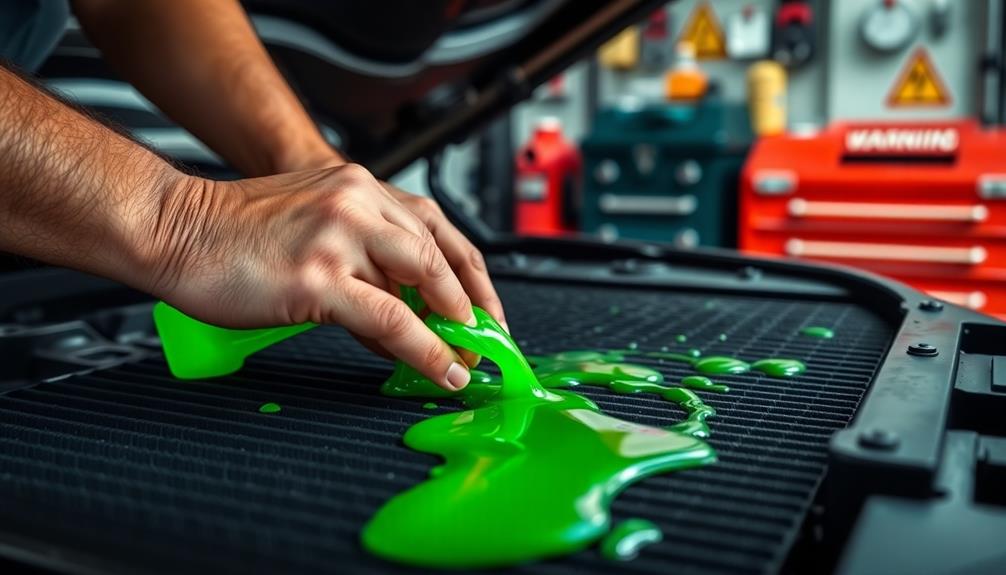
When you catch a whiff of coolant, it's essential to remember that its sweet smell can mask serious health risks. This lovely scent comes from ethylene glycol, a common coolant ingredient that can be quite toxic. If you breathe in too much of those coolant fumes, it can lead to breathing problems and other health issues. So, always be cautious!
The sweet smell might seem nice, but it can mean there are problems with your engine, too. Plus, this is a big deal for your furry friends! Pets are often attracted to that sweet taste, which can lead to harmful ingestion if they get into it. Keeping coolant away from pets is one of the best safety considerations you can take.
Using alternatives like propylene glycol can make things safer while still keeping your vehicle cool.
Final Thoughts
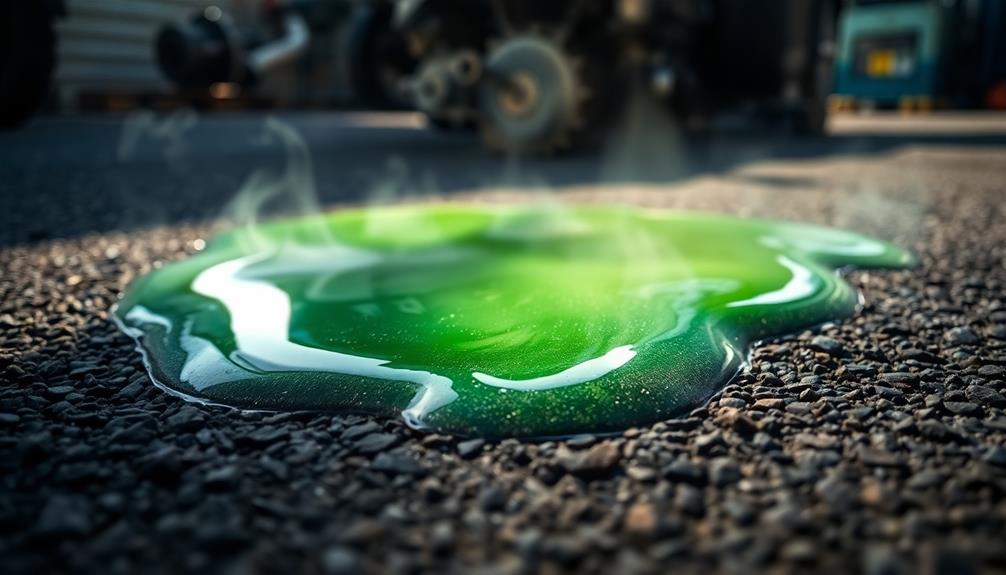
Addressing coolant odors promptly can save you from bigger problems down the road. If you notice a sweet smell, like maple syrup, it might be a sign of a leak in your cooling system. This isn't just a fun fact; it's something to take seriously!
If the burning smell gets stronger when your engine is hot, that could mean trouble, like a cracked head. To stay ahead of serious problems, make sure to have regular inspections of your vehicle. These checks can help catch leaks before they turn into big headaches.
If you ever smell coolant odors, consider getting a pressure test done. It's a smart way to find out if there's a leak hiding somewhere. Remember, ethylene glycol, a part of coolant, can be toxic, so don't ignore those smells!
Taking care of your car can be simple and fun. By keeping your eye out for those sweet smells and scheduling regular inspections, you're helping your vehicle stay healthy and happy. So, keep your nose sharp and your engine running smoothly!
Frequently Asked Questions
What Does a Coolant Smell Like?
When you notice a sweet smell, think of maple syrup or burnt sugar—it might be coolant. If it intensifies when the engine's hot, you should check for leaks or more serious issues. Stay cautious!
Does Car AC Coolant Have a Smell?
Car AC coolant typically doesn't have a smell when everything's working right. If you notice a sweet odor, it might mean there's a leak. You should have it checked out immediately for safety.
How Do I Know if My Coolant Is Leaking?
To know if your coolant's leaking, check for wet spots under your vehicle and monitor the reservoir levels. Inspect hoses and the radiator for moisture, and consider using UV dye to detect hidden leaks.
Does Low Coolant Make a Car Smell?
Yes, low coolant can make your car smell. If you notice a sweet or burnt odor, it might indicate coolant leaks or overheating. Regularly check levels and address any unusual smells to prevent engine damage.









